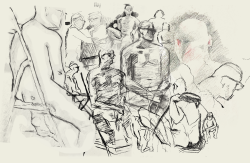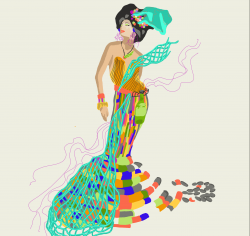It’s 3:00 a.m. You’re in desperate need of some Chunky Monkey to finish your essay and a latte while you’re at it, but you can’t bring yourself to get up. (Plus, nothing is open at this hour but CVS.) Suddenly, there’s a knock at the door, and an angel wearing a “Kozmo” logo hands you the aforementioned treats. Is this heaven, the far future, the cutting edge of technology, perhaps?
Nope. It’s NYC in 2001, a world where kozmo.com delivers anything to your door within the hour and the setting for Thomas Pynchon’s most recent novel Bleeding Edge. Pynchon is loved by many and hated by some for his post-modern flair. (He uses of “sez” instead of “says,” for example.) Bleeding Edge continues in this tradition and is more than just readable. It is stylistically impressive and topically enthralling.
One particularly beautiful passage stands out: “There’s that clean, rained-on smell. The traffic noise gets liquefied. Reflections from the street into the windows of city buses fill the bus interiors with unreadable 3-D images, as surface unaccountably transforms to volume. Average pushy Manhattan shmucks crowding the sidewalks also pick up some depth, some purpose—they smile, they slow down, even with a cellular phone stuck in their ear they are more apt to be singing to somebody than yakking. Some are observed taking houseplants for walks in the rain. Even the lightest umbrella-to-umbrella contact can be erotic.”
Ok, so it’s not Nabokov. It’s not trying to be Nabokov, and, as you may know, in my humble opinion it’s practically impossible to measure up to Vladimir’s genius. But Pynchon is just as erudite and challenging with a less ivory tower modern sensibility and more street-level wordplay. More importantly, his subject matter is societal and systemic, not just interpersonal.
Fraud investigator Maxine Tarnow is the accessibly tech savvy (but not tech-genius) protagonist of Bleeding Edge. Since losing her official license for fraud investigation, Maxine has taken on a more unsavory case, where things get serious fast—because Pynchon takes things seriously. CIA operatives, rooftop snipers, and a hell of a lot of important computer code juxtaposed with the dot-com crash culminate in 9/11, and somehow Maxine is involved in the action. But as close as she gets to solving the many mysteries Pynchon presents, she is never more than a minor player.
The most powerful actor is Gabriel Ice, tech mogul extraordinaire. Ice is a tech genius with a few successful start-ups and some suspicious bank accounts in Saudi Arabia. Yet Ice is definitely not an Edward Snowden figure—in fact, he’s the reverse Snowden, if you will. He uses his talent to aid the government in neoliberal colonialism, one of Pynchon’s most hated aspects of modernity. No wonder he feels driven to be post-modern. So if you stand for transparency and for less perverse neoliberalism in the Reaganistic tradition, then you can’t help but want Gabriel Ice to be frozen out.
Which of course perfectly sets the stage for both Julian Assange and Edward Snowden—you almost wonder if Pynchon didn’t write their stories himself. Still, in Bleeding Edge, Pynchon focuses on the everyman’s interaction with a terrifying, topsy-turvy modern world. He’s not writing for quant geniuses looking to uncover the ins and outs of cyber security, but for qualitative, open-minded readers.
One of the many minor hackers in the novel claims, “We build it, we disable it. You’re frowning. We’re beyond good and evil here, the technology, it’s neutral, eh?” The leviathan of Bleeding Edge isn’t the bad guy—Gabriel Ice—but the whole Internet, the “bleeding edge,” high-risk technology itself. There’s probably some algorithmic way of assessing the impact of the Internet, but nothing gives as comprehensive and stimulating an assessment of modern technological society as Pynchon’s novel.
Pynchon himself is known as a conspiracy theorist and a recluse extraordinaire, so the topics his newest novel tackles come as no surprise. The author refuses to be photographed and has granted no more than a fistful of interviews over his 50-year career. So naturally, his personal life and opinions are a hot topic. With this book, the debate over Pynchon has gone meta—it’s not about his post-modern writing anymore. Instead, critics and readers alike keep trying to figure out if he’s cool and removed, or just the ultimate shmuck.
I’d argue neither, but I will argue for the genius of Bleeding Edge. When Pynchon lends legitimacy to the American mess, the commercial crap, the glamor-less 20th century construction, the seedy side streets, and the drunken tech nerds, you forget all about the glamour of the classics.
Pynchon is a new classic, sez this humble reader. Daring, not dangerous, and with a book like his most recent, I guarantee you a return on your investment. Now that kozmo.com is in business, you can get your Pynchon delivered as needed, with Ben & Jerry’s to accompany it.





amazing, as always :)